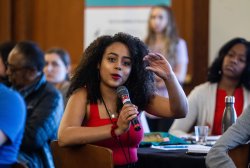Young Voters Find their Political Voice
Montclair State hosts national Andrew Goodman Foundation Summit on civic leadership
Posted in: University

As the 2020 election heats up, student leaders on college campuses across the country are strategizing on ways to empower young voters and influence political debate. At leadership training hosted at Montclair State University, they also found inspiration from activists who served in the trenches of civic engagement.
“You have the power,” said Clarence Jones, an advisor to Martin Luther King Jr. and scholar in residence at Stanford University. “Wake up every morning and know that you, your generation replicated across this country, can make a difference.”
The 2019 National Civic Leadership Training Summit, themed “Live the Legacy,” championed a more inclusive democracy by arming student leaders with ways to get the many young people who don’t vote off the sidelines and into the polls. It was hosted by the Andrew Goodman Foundation, a nonprofit that supports leadership development, voting accessibility and social justice initiatives on campuses.
“There’s not just one model for being a social justice advocate,” said Myrna Perez, deputy director of the Brennan Center’s Democracy Program and leader of the Center’s Voting Rights and Elections project. “There are lot of different ways that people can connect. We need all of them in this big fight or we’re not going to be successful.”
The five-day event commemorated the 55th anniversary of the murders of Andrew Goodman, James Chaney and Michael Schwerner, Freedom Summer volunteers killed on June 21, 1964 by the Ku Klux Klan while registering African Americans to vote in Mississippi. “That really woke people up, said Sylvia Goodman, the foundation’s executive director. “What does it take to wake people up today? Everything is on the line again.”
Guiding students to the polls presents a range of challenges, everything from apathy that their votes can make a difference to suppression tactics blocking college-age voters. New state laws in some parts of the country restrict voter registration efforts and make it harder or less convenient for eligible voters to vote. In attempts to prevent young people from participating, polling places have been moved from college campuses and student IDs refused for identification, said Yael Bromberg, chief counsel for voting rights for the Andrew Goodman Foundation.
“Some of them are intentional discrimination,” Bromberg said. Others are a “design of a system that does not fundamentally uphold or appreciate the unique value that young voices share within our democracy.”
Montclair State shares the Foundation’s commitment, partnering to amplify student voices and “embrace their power to both vote and hold elected officials accountable,” says Mariel Pagán, Montclair State’s director of the Center for Student Involvement.
“Although politics and voting seem confusing, it is my role and more importantly my goal as a student leader to help all students become more comfortable voicing their opinions and contributing to our society,” said Jehan Abayhan, a junior accounting major at Montclair State.
Abayhan is among the student ambassadors working with the Office of Civic and Voter Engagement to provide registration and election materials. They also host conversations with policymakers shaping democracy and poll “parties” that make participation a celebration, all which have contributed to earning the University the designation Voter Friendly Campus.
“My goal is not to influence how students vote but rather, influence them to vote,” says Joseph Dybas, a Montclair State junior studying Political Science with minors in Global Security and Diplomacy and Public Administration. “Despite one’s ideology, we should all feel the need to participate in our democracy and work together to make tomorrow’s world a better place.”
